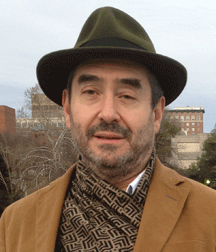非常抱歉,
你要访问的页面不存在,
非常抱歉,
你要访问的页面不存在,
非常抱歉,
你要访问的页面不存在,
验证码:

职称:Professor
所属学校:University of South Carolina-Columbia
所属院系:Spanish
所属专业:Spanish Language and Literature
联系方式:
I teach courses on Cervantes, Spanish Early Modern Literature, Introduction to literary analysis and Spanish Culture. My scholarship has focused on the relation of literary works to ideological and political discourses in Early Modern Spain (16th and 17th centuries). I have published on Cervantes’s narrative, including on Don Quijote, on picaresque narratives and other major authors of the Spanish Golden Age. Currently, I am exploring a new area of scholarship on Spanish literary and cultural works within a global context. It could be argued that during the 20th century this imaginary has been configured by the contradictory and uneven conjuncture of three cultural references: the so-called European “vocation” of Spain, the North-American (USA) models of modernity, and the Latin-American projection as a legacy of Spain’s old empire. Each of these references has its own dynamics and in many moments they would seem to conflict to each other as mutually incompatible. At some point, these references may have functioned simultaneously, or one of them may have assumed a temporarilry privileged position. While social and economic progress have been equated with the participation of Spain in an European culture of ambiguous and loosely defined characteristics, the ‘roots’ of Spain’s identity in the colonization of America has always been asserted in both liberal and conservative accounts of a Spanish distinctive role in the world. While liberals, on one side, and traditionalists and fascists on the other have tended to show a condescending attitude or an open distaste for North American way of life and culture, the fact is that after Franco’s Treaties with Washington in the 1950’s Spain’s cultural imaginary has followed pretty much the designs of US cultural industry in many important aspects. I want to investigate changes in Spain’s national imaginary as a result of the global impact of cultural process.
I teach courses on Cervantes, Spanish Early Modern Literature, Introduction to literary analysis and Spanish Culture. My scholarship has focused on the relation of literary works to ideological and political discourses in Early Modern Spain (16th and 17th centuries). I have published on Cervantes’s narrative, including on Don Quijote, on picaresque narratives and other major authors of the Spanish Golden Age. Currently, I am exploring a new area of scholarship on Spanish literary and cultural works within a global context. It could be argued that during the 20th century this imaginary has been configured by the contradictory and uneven conjuncture of three cultural references: the so-called European “vocation” of Spain, the North-American (USA) models of modernity, and the Latin-American projection as a legacy of Spain’s old empire. Each of these references has its own dynamics and in many moments they would seem to conflict to each other as mutually incompatible. At some point, these references may have functioned simultaneously, or one of them may have assumed a temporarilry privileged position. While social and economic progress have been equated with the participation of Spain in an European culture of ambiguous and loosely defined characteristics, the ‘roots’ of Spain’s identity in the colonization of America has always been asserted in both liberal and conservative accounts of a Spanish distinctive role in the world. While liberals, on one side, and traditionalists and fascists on the other have tended to show a condescending attitude or an open distaste for North American way of life and culture, the fact is that after Franco’s Treaties with Washington in the 1950’s Spain’s cultural imaginary has followed pretty much the designs of US cultural industry in many important aspects. I want to investigate changes in Spain’s national imaginary as a result of the global impact of cultural process.